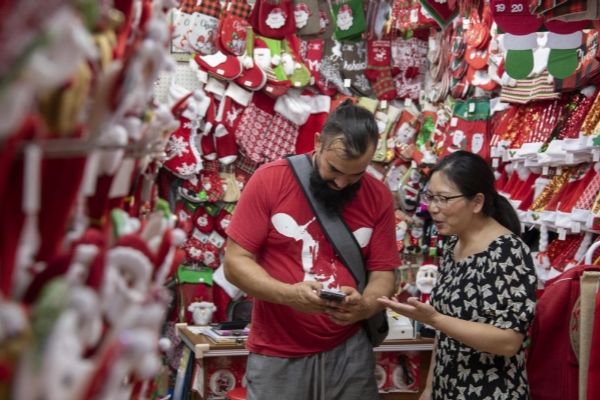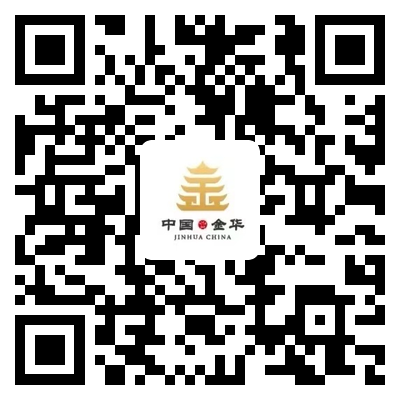
A merchant from Poland (left) browses Christmas items in Yiwu, Zhejiang province, in July. [SHI KUANBING/FOR CHINA DAILY]
Yiwu, Zhejiang province, is globally renowned as the largest production and distribution hub for Christmas products, responsible for nearly 80 percent of the global supply. This year, the city's Christmas market is experiencing a strong revival, with merchants noting an increase in early orders and heightened demand overall.
Traditionally, the peak export season for Yiwu's Christmas goods is from July to September. However, in 2024, demand has surged earlier than usual and the interest in orders continues unabated. This earlier start has presented both opportunities and challenges for local vendors, who are adapting to new market dynamics and increased client expectations.
Jin Xulan, a vendor specializing in Christmas ornaments, described the shift she has seen in customer behavior. "Clients placed orders much earlier this year, with many international clients securing Christmas 2024 products as early as the end of last year," Jin said. This change, she and other vendors believe, is partially due to difficulties in sea shipping. Issues like the ongoing Red Sea crisis have led to rising shipping rates and tighter capacity. "These factors are pushing clients to secure their orders earlier than in previous years, ensuring they get what they need well ahead of the season," Jin added.
"Although Christmas is in December, clients place orders in advance. In fact, we started our operations right after the 2024 Chinese New Year in February, and about a week later some clients came to place orders for Christmas. Some of the larger clients even came to place orders at the end of 2023," said Jin.
As Yiwu's reach in international markets has expanded, the traditional sales cycles for holiday products have been transformed. Clear distinctions between peak and off-peak seasons have faded, and many local businesses now receive orders year-round. Some clients, who initially placed orders at the start of 2024, are already discussing their needs for the next holiday season. Luo Meili, who sells Christmas lights exclusively to international clients, said: "Sales this year have already increased by 10 percent compared to last year, and clients keep returning to place larger orders. We've observed a steady rise in demand over the past two years, with a marked increase in the volume of orders from longtime clients."
Yet, this rise in demand comes with its own challenges. For Yiwu's Christmas sector, maintaining relevance means constant innovation. "Innovate or be left behind" is a guiding principle for businesses striving to stay competitive in the face of changing consumer preferences. Vendors like Jin recognized the need to regularly update and diversify their product lines to capture market interest. "Christmas ornament orders for decorative lights and balls are higher than other kinds of products that we sell. Each year, we develop new Christmas ball molds to match trends. Where red, blue, gold and silver used to dominate, we're now producing items in pastel tones and adding custom colors tailored to clients' evolving tastes," Jin said. Even packaging has evolved from simple wraps to gift-style boxes, helping vendors appeal to a broader, more sophisticated overseas clientele.
In Jin's store, Christmas lights are exported to clients around the globe, reaching markets as diverse as the United States, Chile, Mexico, Kazakhstan and many African countries. This year, she's noticed a marked increase in Brazilian customers, a relatively new but expanding market. "We've seen many Brazilian clients in recent months. They're already asking about next year's Christmas lights and have even specified their preferred colors and styles, and are planning to place orders through trade companies when the time comes," she said.
For many vendors in Yiwu, the top priorities remain quality and competitive pricing, both of which have proven key to the city's success. Luo, whose products are produced in Taizhou, Zhejiang province, and primarily sold in Yiwu, noted that customers are highly focused on quality and cost-effectiveness. "Our products undergo stringent quality control at every stage, from factory production to front-end sales here in Yiwu," she said. While the competitive pricing of Yiwu products is a significant draw, Luo emphasizes that quality is never compromised, contributing to a noticeable reduction in customer complaints each year. "Keeping our quality high while offering affordable prices has helped us establish trust and retain clients over time," Luo said.
"We are currently developing new products and preparing fresh samples for clients for next year. Our samples are also evolving, as we strive to create products that will better satisfy our customers," added Luo. "It's essential for us to communicate with clients to understand what aspects they value most and where we can make adjustments. We're aiming to develop some innovative new samples based on their preferences."
Yiwu's emphasis on quality and innovation is clearly paying off, as reflected in its growing export statistics. Data from Yiwu Customs reveal that from January to September of this year, the city's total import and export value reached 499.88 billion yuan ($69 billion), marking a 16.6 percent increase year-on-year. Exports accounted for 441.09 billion yuan, up by 16.1 percent, while imports grew by 20.3 percent, reaching 58.79 billion yuan.
This trend is part of a broader economic upswing in Zhejiang province, where the total value of foreign trade hit 3.93 trillion yuan in the first three quarters, underscoring Zhejiang's position as a leading contributor to China's trade performance.
Looking to the future, Yiwu's Christmas market faces continued high demand for innovative, high-quality and competitively priced goods. Strong international sales, particularly in emerging regions like South America, offer significant growth opportunities. However, challenges persist as vendors grapple with rising production costs and increasing international competition from regions with lower labor costs. While optimistic about future growth, Yiwu merchants remain aware that adapting to changing economic pressures and sustaining quality standards are essential to maintaining their edge in the global market.

